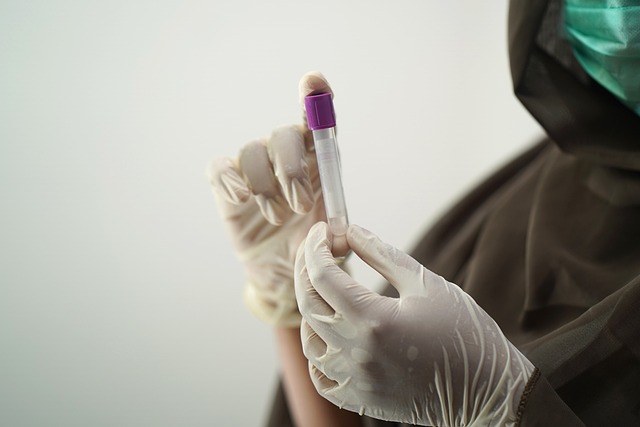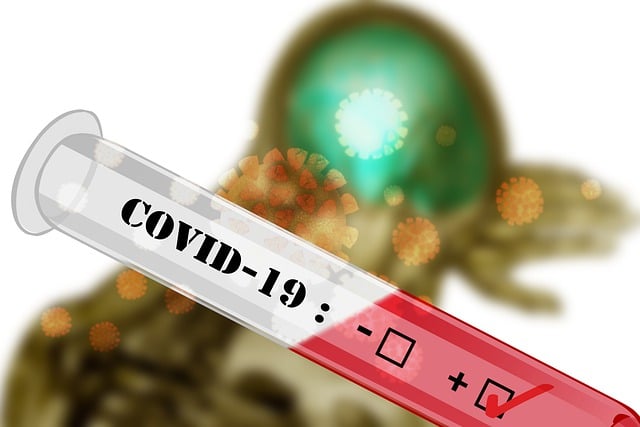The UK Standard Thyroid Blood Test is a key diagnostic tool for assessing thyroid function. It measures TSH, Free T4, and sometimes Free T3 levels to provide a comprehensive understanding of thyroid health. Accurate interpretation of these hormone levels is crucial for diagnosing conditions like hyperthyroidism or hypothyroidism, which can be influenced by various factors including medications, health conditions, and stress. Patients should be aware of the normal ranges for these hormones and discuss their full medical history with healthcare providers to ensure precise diagnosis and effective treatment. A thyroid examination kit, available in the UK, includes a suite of diagnostic tools and educational materials covering thyroid dysfunction symptoms, lifestyle influences, and dietary advice. It also features a patient health diary and a thyroid self-examination guide for regular monitoring and early detection of issues. This comprehensive approach to thyroid evaluation supports informed consultations with healthcare providers and facilitates effective management of thyroid disorders within the UK's NHS standards and clinical guidelines framework, ensuring consistent and evidence-based care tailored to individual patient needs. Regular follow-up and therapy adjustments are necessary for maintaining optimal thyroid function and managing associated health issues effectively.
navigation through thyroid health is paramount for individuals in the UK. This article serves as a guide, elucidating the UK Standard Thyroid Blood Test and its significance in diagnosing thyroid disorders. We delve into the essential components of a tailored thyroid examination kit, empowering patients to take an active role in their health journey. Further, we provide clarity on interpreting test results, ensuring patients understand the implications for their well-being.
- Understanding the UK Standard Thyroid Blood Test: A Comprehensive Guide for Patients
- Key Components of a Thyroid Examination Kit Tailored for UK Patients
- Interpreting Your Thyroid Blood Test Results: What Do They Mean for Your Health?
Understanding the UK Standard Thyroid Blood Test: A Comprehensive Guide for Patients

The UK Standard Thyroid Blood Test is a critical diagnostic tool for assessing thyroid function in patients. It encompasses several key measurements that provide a holistic view of thyroid activity within the body. This test includes the evaluation of Thyroid-Stimulating Hormone (TSH), Free T4 (FT4), and sometimes Free T3 (FT3) levels. Understanding the normal ranges for these hormones is essential for patients to interpret their results accurately. TSH, produced by the pituitary gland, is the first indicator of thyroid status as it signals the thyroid to produce or reduce hormone production. FT4 and FT3 are the active forms of thyroid hormones circulating in the blood and reflect the body’s current state of thyroid function. Elevated or suppressed levels of these hormones can indicate hyperthyroidism or hypothyroidism, respectively. Patients undergoing this test should be aware that certain medications, health conditions, and even stress can affect thyroid hormone levels, which may influence test outcomes. Thus, it is imperative for patients to discuss all relevant medical history with their healthcare provider to ensure accurate diagnosis and appropriate treatment.
For UK patients seeking to understand the results of their thyroid blood tests, comprehensive guidance from healthcare professionals is invaluable. The interpretation of these results should consider individual patient factors, including symptoms, overall health status, and medical history. A high-quality thyroid examination kit, ideally one that includes a pre-paid envelope for sample collection, can facilitate the process by enabling patients to take samples comfortably at home. This kit often comes with clear instructions, ensuring that patients can collect their samples correctly before sending them to a certified laboratory for analysis. With the results in hand and professional advice, UK patients can make informed decisions about their thyroid health management, which is crucial for maintaining overall well-being.
Key Components of a Thyroid Examination Kit Tailored for UK Patients

A comprehensive thyroid examination kit tailored for UK patients should include a variety of diagnostic tools and resources to accurately assess thyroid function. Central to this kit is the UK Standard Thyroid Blood Test, which measures key hormones such as TSH (thyroid-stimulating hormone), Free T4 (free thyroxine), and sometimes Free T3 (free triiodothyronine). These hormones are pivotal in managing thyroid health, as they regulate metabolism, growth, and development. Additionally, the kit may contain patient education materials, including information on symptoms of thyroid dysfunction, lifestyle factors affecting thyroid health, and dietary recommendations that are relevant to UK residents. This ensures patients have a clear understanding of their condition and how to manage it effectively within the context of their daily lives. The inclusion of a thyroid self-examination guide is also beneficial, as it empowers patients to monitor any changes or anomalies in their thyroid gland, which can be crucial for early detection and intervention. Completing the kit, a patient health diary aids in tracking symptoms, medication intake, and thyroid hormone levels over time, providing a comprehensive picture of thyroid health trends and enabling more informed discussions with healthcare providers. This holistic approach to thyroid examination ensures that UK patients receive a thorough and personalized evaluation of their thyroid function, facilitating the management of thyroid disorders effectively.
Interpreting Your Thyroid Blood Test Results: What Do They Mean for Your Health?

Understanding the results of your UK Standard Thyroid Blood Test is pivotal for managing thyroid health effectively. This test measures key hormones and parameters, including TSH (thyroid-stimulating hormone), Free T4, and sometimes Free T3. Elevated or suppressed levels of these hormones can indicate hyperthyroidism or hypothyroidism, respectively. For instance, an elevated TSH typically suggests an underactive thyroid, prompting a need for thyroid-stimulating medication to regulate hormone production. Conversely, low TSH levels often point to an overactive thyroid, which may require medication to manage symptoms and prevent complications. Interpreting these results in the context of your symptoms and clinical examination is crucial, as thyroid dysfunction can affect various bodily functions, including metabolism, mood, and overall energy levels. It’s advisable to discuss these results with a healthcare professional who can provide personalized guidance based on the UK standard reference ranges and your individual health profile.
In the UK, the interpretation of thyroid blood test results is guided by established clinical guidelines and NHS standards. These standards ensure that patients receive consistent and evidence-based care. The implications of thyroid hormone levels are not solely dependent on the numbers but also on the patient’s unique presentation and medical history. A healthcare provider will consider these factors to determine whether thyroid dysfunction is present, its severity, and the appropriate course of action. Regular monitoring and adjustments to treatment may be necessary to maintain optimal thyroid function and manage associated health conditions effectively.
In conclusion, understanding the UK Standard Thyroid Blood Test is pivotal for patients in managing their thyroid health effectively. The comprehensive guide presented here demystifies the components of this test and empowers individuals with the knowledge to interpret their results. With the key components outlined for a thyroid examination kit tailored specifically for UK patients, self-monitoring becomes a viable and informed option. This toolkit ensures that patients can actively participate in their healthcare journey, leading to better outcomes and more personalised care. By equipping oneself with this knowledge and the appropriate test kit, UK patients can take control of their thyroid health, ensuring timely and accurate diagnosis and management of any issues arising from thyroid dysfunction.
